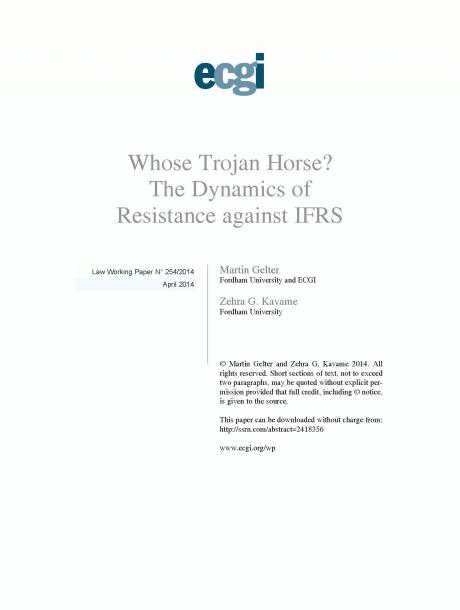
Whose Trojan Horse? The Dynamics of Resistance against IFRS
Abstract
The introduction of International Financial Reporting Standards (IFRS) has been debated in the United States since at least the accounting scandals of the early 2000s. While publicly traded firms around the world are increasingly switching to IFRS, often because they are required to do so by law or by their stock exchange, the SEC seems to have become more reticent in recent years. Only foreign issuers have been permitted to use IFRS in the US since 2007. By contrast, the EU has mandated the use of IFRS in the consolidated financial statements of publicly traded firms since 2005. In the US, IFRS, which are promulgated by the London-based International Accounting Standards Board (IASB), are often seen as an attempt by Europeans to colonize US accounting standard setting, in other words an element of a foreign legal system alien to US capital markets and securities law. In this article, we suggest that this perception is actually a myth, which we are trying to debunk. In fact, the introduction of IFRS in Europe, particularly Continental Europe, was far from controversial. IFRS were promoted by Anglo-Saxon jurisdictions and strongly supported by the United States, particularly when capital markets internationalized in the 1990s. They were ? and still are ? in many ways at odds with the Continental European accounting cultures of countries such as France and Germany, on whose examples we draw. In spite of the EU mandate for publicly traded firms, accounting law in these jurisdictions has still not fully absorbed IFRS; nevertheless, for now a solution that reconciles traditional and international accounting have been found. In this article, we explore the problems and resistance of IFRS in Continental Europe and seek to draw lessons for the United States. We argue that given the shared heritage of US GAAP (Generally Accepted Accounting Principles) and IFRS as investor-oriented accounting standards their introduction in the US should be considerably easier than it was on the other side of the Atlantic.





